Saturday, 06 April 2024
To find a place for an organic lunch, snack or a coffee break, both served and self-served, requires not more than keeping your eyes open. But the cultured evening out or a sumptuous weekend brunch can be a challenge if you don't know where to head for.
If you opt for 100 percent organic food and drinks, without compromises, within the city boundaries the TL;DR is La Trattoria and Josef.
French
Given the French love for quality food one would expect all self-respecting French restaurants to use organic ingredients to a certain extent, but to actually find those which do proves to be harder than expected. In Munich head for brasserie La Bouche in Schwabing, a tastefully decorated place a few steps away from Münchner Freiheit. They promise to use organic ingredients throughout the menu, with three quite excusable exceptions: snails, seafood and Marsala wine.
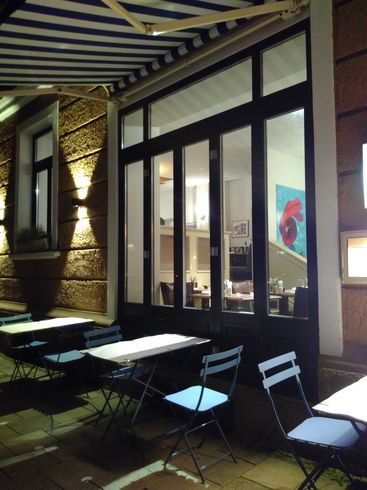
In fact the exception list varies depending on daily supplies – when I went there the lamb and the duck liver had been added – but since it is all transparent and clearly stated on the menu you can adapt you order accordingly. The food itself is hearty French countryside fare, apart from the risottos (together with the Italian coffee the international touch to the menu) most dishes focus on meat or seafood. Since the main courses are very generous compared to other French restaurants, come hungry or skip the starter. In the meat-based stews we had – coq au vin and an ox liver ragout – the flavours of the ingredients were perfectly amalgamated and harmonic. The entrecote marinated in a pesto of fresh herbs – although perfectly cooked rare – however, did not live up to expectations, too perfumed, too imbalanced (and way too big) for my taste. Although the side dishes – salads, stewed root vegetables, fried potatoes, and similar – clearly play a supporting role they were well done and tasty. And the baguette served together with the starters was clearly one of the best I ever had.
Sadly the wines aren't organic, the soft drinks however are, and the bar offers organic pastis, gin and vodka. Note that the place is closed on Sundays.
German/Bavarian
With its rustic and cosy flair and garden tables under horse chestnut trees during the warm season Zum Kloster in the heart of the former village of Haidhausen a short walk from Wiener Platz makes the perfect surrounding for a laid-back chat with friends. They serve a selection of organic non-alcoholic beverages and up to three dishes on their meat-centric hand-written menu are marked with a star as made with organic meat, eggs and flour, one of them being Spaghetti Bolognese. The dishes are simple, but perfectly eatable home-made fare. Only the salad should better not have been as soaked in rapeseed oil as it was.
For take away come with your own container to avoid extra waste. (The covid-19 delivery service was discontinued.)
If heading for the classical Bavarian Wirtshaus – rustic, but perhaps missing the air of the students' and artists' pub present in "Zum Kloster" – the Klinglwirt at the opposite end of Haidhausen near Rosenheimer Platz is the place to go. They serve organic meat from the nearby farm in Herrmannsdorf, organic cheese, bread, coffee, tea as well as Del Fiore ice-cream. Even the side-dishes – mainly potatoes, dumplings, sauerkraut, red cabbage and rustic salads – are now often organic, and vegetarian and vegan dishes have become a permanent part of the menu in their own right. The drinks menu offers at minimum one organic option for most beverages. Little guests are welcomed warmly, among others with a decent menu of their own (most kids will accept happily that the dishes listed there are almost free of greens). The restaurant is a member of Green Chefs, a network of eco conscious and socially responsible chefs.
While the Munich population has strong, yet mixed
feelings about the Oktoberfest, the strong beer festival during lent
is probably meeting much less negative sentiment among locals.
In fact, the political cabaret ("Derblecken") at the opening of the festival,
is a major event in local politics.
Although the host brewery, Paulaner, does not brew organic beer, the very
place of the festival, the
Nockherberg restaurant in the Au, offers parts
of its menu in organic quality: All organic items are marked green, or (as for the beverages) with the organic label.
They use organic flour and milk, the tofu is both, Bavarian and organic, and a selection of traditional meat dishes like the "Böfflamot" (the Munich version of
"boeuf a la mode") are made with organic meat.
Mind you that there is a decent selection of organic wines and non-alcoholic beverages, but no organic beer.
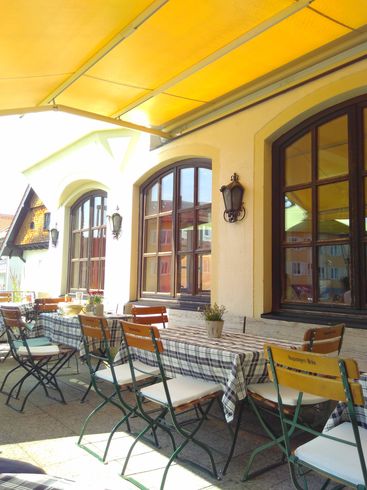
For the 100% organic experience of Bavarian cuisine take the tram no. 25 from Rosenheimer Platz to its final destination in the suburb of Grünwald. A five-to-ten minutes walk from there you'll find the only organic hotel in reach, Alter Wirt, with its rustic, yet up-market restaurant. Children are welcome and often even allowed a visit to the kitchen, but the place is spacious enough that occasional little guests won't spoil your romantic candle-light dinner. There's a beergarden under horse chestnut trees, and the entire place is a real oasis in suburbia. The menu focuses on the meat- and fish-centric Bavarian Sunday kitchen completed with dishes of Italian origin. The food is extremely tasty, home-made, yet peppered with pleasant little twitches of ambitious chefs. Not the natural place for vegetarians, but if you happen to be the only vegetarian in a group of omnivores, there's a tasty meal for you as well. In addition they offer a range of assorted organic spirits.
Early risers may also step by for breakfast.
If you prefer a sandwich and coffee on the go turn to the co-located artisanal Brotzeit bakery.
Fancy a day out in the Bavarian countryside? So why not paying a visit to the Herrmannsdorfer farm about 30 kilometres from Munich? Their up-market 100 percent organic restaurant, the Wirtshaus zum Schweinsbräu, rewards with the finest of Bavarian food traditions.
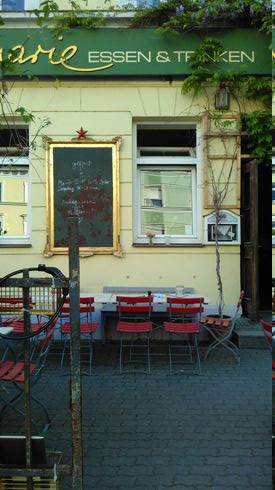
At tube stop Poccistraße in Sendling, just across the street from the Vollcorner branch in Lindwurmstr. 80 the Goldmarie restaurant serves classical and modern versions of seasonal Bavarian, Austrian and North-Italian dishes – quite palatable, but also a little boring. It's very obvious that the quality of the ingredients makes the difference here rather than the skills or visions of a chef: Usually the meat is organic and – in this case – marked "bio" on the menu. The veges are often organic, too, though not marked. Not organically certified meat and greens come from small-scale conventional farms in the region. Unfortunately the drinks (except for the gin and the herb tonic water) aren't organic. The place itself is often quite crowded.
They advertised "Highclass organic food" in the 2015 print issue of Spy city guide, and you will find them listed as organic on the web, too, but when I rang them up a few years ago the staff ensured me repeatedly: No, we do not use organic ingredients. Since they themselves do not mention the word "bio" on their German website it's likely that lack of command of the English language lead to this misconception. But one must never say "no" – the menu as of April 2024 advertises organic bread (with vegan spread) by Munich's it-bakery Julius Brantner, and with Munich's gastronomy and club icon Sandra Foster of the Blitz restaurant behind it the Roecklplatz restaurant is definitely worth a visit: It is a socially responsible enterprise employing young apprentices in difficult life situations and/or without formal education which in itself deserves support.
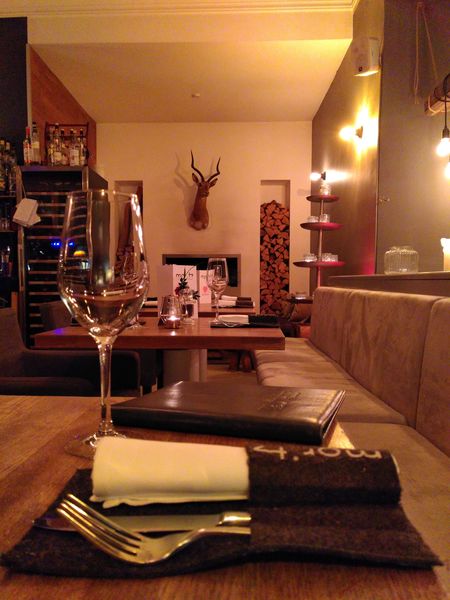
International
Not a single word on their menu suggests that Miss Lilly's kitchen in Giesing prefers organic ingredients. But when tasting their huge and extremely yummy home-made burgers or Wiener Schnitzel it's perfectly reasonable that not only the meat (as confirmed by the staff) but also a good deal of the side-dishes are at least partially organic. Although vegetarians are catered for it's very obvious that Miss Lilly's chef prefers meat and does it perfectly. If you come with kids and ask for fries they will be served huge portions – so don't order too many.
The place near tube stop Kolumbusplatz serves breakfast until 5 pm and is famous for their home-made American cheesecake – I had the peanut butter variety which was very palatable, but to my taste not as exceptional as I had heard, together with a proper Italian-style coffee.
Tuesday to Saturday evening it turns into Moritz bar and restaurant, with a likewise tempting menu specializing in the South-German and alpine cuisines. If you are after an organic alcoholic drink you have to stick to The Duke gins – the wine and gin menu unfortunately does not leave you with much choice.
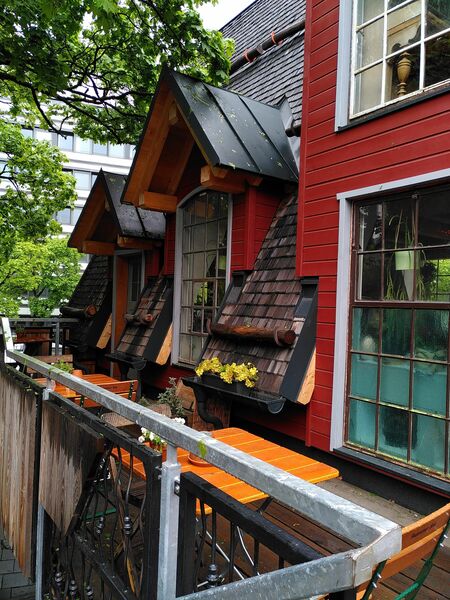
A wooden witch cottage, with several hideaways, balconies, verandahs to almost get lost in, indoors and outdoors, an open cultural stage, magical sourroundings (almost) under a train bridge – no, the appearances of the bar
Gans Woanders near Kolumbusplatz are deceptive: This is not an
ancient building, but a brand-new construction opened in 2020. Although the quantity of organic ingredients used in the menu dominated by pizza and cake does not entirely live up to the sustainability promise of the place, you'll find at least organic
coffee, tea and lemonades, and I was assured that the potatoes always were organic. Note that the place is self-services and accepts
cash only.
In the South-Eastern part of Giesing, near congested Tegernseer Landstraße yet tucked away in a pleasant neighbourhood at Alpenplatz you will find another rustic place, Das Edelweiß. Since it started as an organic restaurant about six years ago you will still find business cards and references describing it as organic, and you can still order organic softdrinks. Unfortunately the concept did not work out, and the focus has shifted from organic towards supporting local and small-scale businesses. Some of the ingredients such as the milk of the Sternenfair brand are produced according to near-organic principles, the tasty artisanal bread may sometimes be made from organic flour, if you come for breakfast on weekends you can have organic chocolate spread, maple syrup and hot chocolate, but you should rather expect artisanal conventional food. When I questioned the owner about it she assured me that she's trying to find a new chef with love for local and seasonal high-quality food, and hopefully a renewed focus on organic principles will follow.
A dedicated family restaurant in the queer and hip neighbourhood of Glockenbachviertel dubbed Kaiser Otto is the place in Munich closest to the cafe latte moms cliche. You may step by for a coffee break during the day, or have breakfast, brunch, lunch, and dinner while your kids may disappear to a dedicated playground room next to the cafe. The latter is however closing at 7 pm. Weekend brunch with child care has been discontinued during covid-19. The food is not very elaborate, but often made from at least partially organic ingredients. Reliably organic items on the menu are coffee, eggs, bread, a selection of soft drinks as well as the meat served with one of the dishes to have for dinner. Greens, veges and pulses may or may not be organic, so you have to enquire, meat items served until 3 pm are definitely not.
The contrary of a family restaurant, i.e. a decent (American-style) bar cum burger restaurant is
The Potting Shed near Münchner Freiheit, a few steps from Brasserie La Bouce. Instead of french fries you're served yummy rosemary-flavoured potatoes, instead of prefab mayonnaise delicate home-made aioli, and the coleslaw was crisp, showing off the (organic) quality of the cabbage. The top of my burger bun was caramelised, adding an interesting twist to the taste, and the patty, announced as medium, still gorgeously pink. Unfortunately they do not do rare burgers which indicates that the meat is minced in advance. All meat products come from a organic-only local butchery, and the delicacy of the food indicates that most of the vegetarian ingredients are organic, too. For those not feeling like having a sumptuous high-calory burger plate (there's one veggie option) there was a tasty seasonal salad (with goat cheese) and a range of tapas, mezze and small starters, decidedly omnivore. Unfortunately the rich bar sports only a few organic drinks, namely an organic Cabernet Sauvignon, The Duke and Lyonel gins (the latter made a nicely balanced jasmin-tea flavoured gin and tonic) and fairly traded cachaça. Soft drinks including the tonic water however aren't organic at all. The bar itself values traditional bar etiquette: an observant yet not obstrusive waiter (who took care of our jackets when we came in), a skilful professional barman, pleasant background music at a volume allowing for effordless conversation (though I cannot say anything about the noise on a Friday or Saturday night), the walls adorned with interesting and tasteful art. Definitely recommended for a civilised evening out.
Italian
Mix the interior of a trattoria in Italy with a Bavarian Wirtshaus, and you'll end up with
Hostaria Rò e Buni, a certified organic Italian restaurant in the heart of Schwabing. The name alludes to the dialect words used in the area of Bologna to steer bullocks to the left and to the right, and the tasty food served here has its roots in the country kitchen of the Emilia Romagna - not too fancy, hearty, receiving its fulfilling taste from high quality organic ingredients, many of them (especially the meat) sourced from farms in the greater region.
Unlike in many other certified restaurants almost all ingredients are organic indeed, those coming from conventional agriculture are clearly marked with a star on the menu. Vegetarian and vegan drinks and dishes can be easily distinguished by a leaf or flower label, respectively. Although the owner has Italian roots don't order a four course menu (antipasti, pasta, primo e secondo) a la carte unless extremely hungry – the sizes of the dishes are adapted to the German habit of ordering a pasta or main course and perhaps a starter. If you feel Italian stick to the four course tasting menu suggested by the menu, or discuss with the affable publican. Don't leave without having tried their fresh home-made pasta, and an organic grappa to finish. If you fancy slow-cooked Italian meat classics like Osso Buco – here's the place to try.
The kitchen closes half an hour before closing time, and the place itself keeps open evenings only.
If you do not want to compromise at all when it comes to organic food and drinks find your way to Sendling: Former Bavarian-Italian restaurant "resihuber" went fully Italian and consequently changed its name to La Trattoria early in 2020. The place is run and backed by the founders of the local Vollcorner supermarket chain and can easily be reached by tube (stop Brudermühlstraße). Unfortunately they do no longer serve breakfast, instead you may order pizza home or (at a small discount) to take away.
The place is also a
convenient choice before or after a concert at (or other visit to) the Gasteig HP8 concert hall and cultural centre, with truly Italian food and predominantly regional ingredients catering for all: vegans, vegetarians and meat lovers. After a concert or stroll at the Isar shore you may also step by for a high quality, fully organic drink, both with or without alcohol.
The place survived the covid-19 pandemics as a pizzeria, and staff shortage in 2024 turned it into a half-serviced restaurant, a concept known from smaller cafes and eateries: Have a seat, memorise the number of your table and place your order at the bar. Food and drinks will be brought to your table.
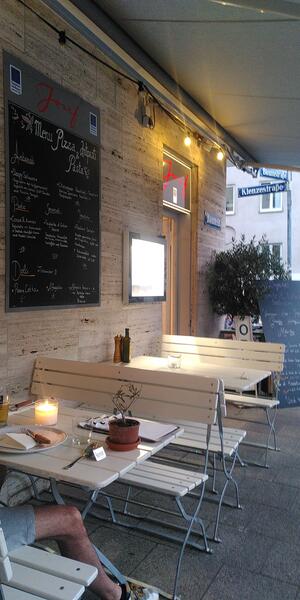
In 2023 the Trattoria got a sister restaurant, the
Osteria Biologica Josef which, located in the
Glockenbachviertel, is much
better accessible from the inner city. During the summer everyone would sit outside in the so-called "Schanigarten", on white garden furniture in lieu of parking lots along the street. The Italian street feeling is matched by excellent food and drinks. An exciting selection of aperitivi and a relatively short menu offering pizza, salads, pasta, and few main courses ensure absolute freshness and tastiness. Most dishes are vegetarian or meat-based (all of them have full meal size), but there are also a few (fully qualified) vegan options – given the shortness of the menu these make up for a higher relative percentage than you may realise at first. As everything is organic, prices are rather up-market, but a delicious pizza with a gorgeous crust (at around 15 EUR) is sufficient for a very satisfying evening. The staff is cheery and helpful. During the colder season there will be brunch, too. Ring in to order a table during opening hours, especially on weekends I strongly recommend this as the online booking system seems to not cover all available tables.
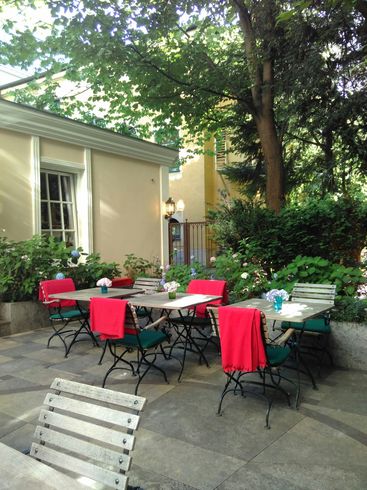
A hidden gem in very upmarket locations, quietly located in a backyard of Maximilianstraße next to the Kammerspiele theater
is Max Trenta, a small Italian restaurant with an open kitchen where organic ingredients, often from small-scale farms, are frequently used, though neither promised nor advertised on the menu. Some of the courses are Italian dishes well-known outside Italy but since the friendly owner values the kitchen of his childhood his guests are so fortunate to taste Sardinian specialities like the fregula pasta type and the typical pane guttiau crisp bread which is served as an appetizer. Unfortunately these crackers tasted very bland, not comparable with the organic ones readily available in Munich's organic groceries. The extremely tasty and characterful natural open wines come from a Sardinian winery co-driven by one of the owner's relatives but aren't organically certified. In the summer you can sit outside where there's a little space for kids. Note that the kitchen closes already at 9pm.
Mediterranean/Oriental
No bosses and driven by consensus: Its unusual organization qualifies the Neuhausen based restaurant cooperative Ruffini for a recommendation on its own. Their Italian and Mediterranean food looks and tastes like mother's – it is prepared with love though without the ambitions of a trained restaurant chef. Although they cater for vegetarians and omnivores alike only meat and eggs are organic. Which is sad – the Imam Bayildi I had tasted bland as the eggplants did not have the concentrated flavour of organic ones. On the contrary their home-made croissants – organic or not – are without doubt worth a sin: You'll have to travel far to find equally full-flavoured ones, so take away (or come to shop at their bakery a few meters away). Have an organic ice-cream for dessert – during the warm season it's also offered to take away.
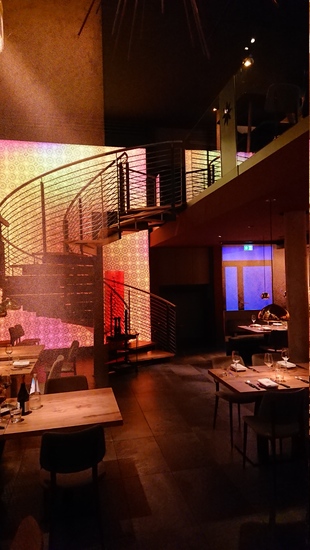
If you love the cooking books by Sam&Sam Clark of the London-based restaurant Moro (which I unfortunately have not had the opportunity to visit) or simply are in the mood for refined yet down-to-earth oriental mediterranean food head for The Spice Bazaar tucked away in a big void between the ticket office of the Bayrische Staatsoper opera house, the Spanish Instituto Cervantes and the Hofgarten garden. In the evening you often won't find a soul on the place before the restaurant, but when you enter a breathtakingly decorated space prided with gold and ornaments is welcoming you – not the bling-bling of an oriental bazaar, but its Bauhaus-inspired interpretation on two floors, the upper one an almost intimate but open gallery. All the meat is certified organic, and you can pick organic wines and soft drinks on the menu, but although many other ingredients most certainly are organic there's no promise to it. The menu and the staff encourage you to share your food with those you came along – in this case all dishes will be placed in the middle of the table and an empty plate will be put in front of each of you. Be warned: the servings here are generous and deliciously spiced so that it's easy to eat far too much. A main course – meat, seafood or vegetarian – with a side dish will satisfy a hungry eater, so rather order less and share, especially if you also opt for one of the tempting first courses. At my first visit we made the mistake of ordering too much (delicately spiced caramellised nuts and bread with gorgeous olive oil as starters for our hungry crowd) so that I cannot say anything about the desserts yet. Prices are upmarket, but if you take into consideration the quality and the quantity they are more than fair.
Opposite the "Osteria
Josef" in the Glockenbachviertel you'll
find Mary – or rather
Das Maria. In fact the restaurant should be called "Maryam" as it specialises in mezze and food (and coffee) from the Maghrib and the Levante. Moreover it has been a famed breakfast spot for many years, serving oriental and orientally inspired occidental breakfast varieties throughout the day, on oriental dishes. The majority of ingredients, staples and drinks are organic and marked as such on the menu, either with an asterisk or with the "bio" keyword.
The place is quite small, so despite its very reliable opening hours and especially during the cold season when outdoor seating isn't an option pre-booking is advisable. Families with babies and toddlers should find a different spot for a family meal as there are no changing facilities, and both, changing and prams are not welcome inside the restaurant.
Japanese/Sushi
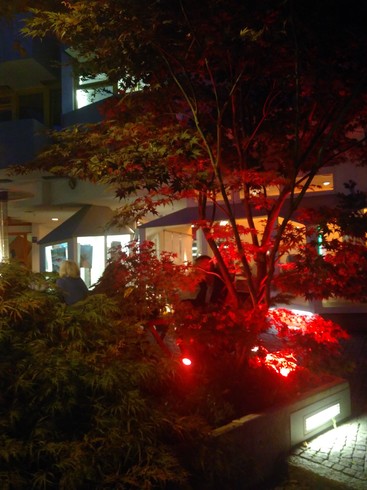
With the explosion of sushi take-aways you may have to kiss many frogs on the quest for sushi worth its name. Arguably one of the best sushi restaurants in Munich is the Sushiya Sansaro in the Amalienpassage backyard passage in Maxvorstadt, a three minutes walk from the Northern exit of the Universität tube stop. As you might expect from a restaurant with love for – in this case – Japanese – food they use some organic ingredients (eggs, spinach and pork for example), the soy sauce is organic and you can order organic beer, juice and some wine with your meal. The menu does not stop with sushi, instead you can get a good impression of the Japanese kitchen, both in its vegetarian and its meat-based variety. The place itself is pleasant but often crowded. If you cannot get a reservation do not dispair: You can also order by phone or online and step by to take away, or even better: Bring your own (bento) box, and wait while your sushi is being prepared.
Lebanese
See here.
Mexican
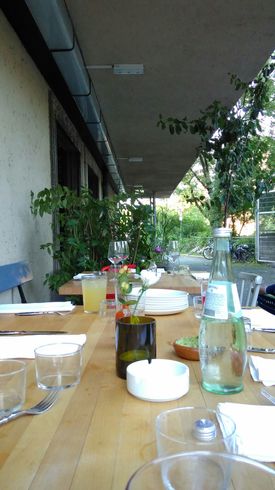
The latest enterprise of prominent Munich publican, club manager and cooking book author Sandra Forster, herself a vegan, is the Blitz ("lightning") club located within the entrance building to the Museumsinsel island housing Deutsches Museum, the congress hall finished in 1935, formerly used as a cinema. Attached to the club is a Mexican-vegetarian restaurant, with dancing skeletons in colourful costumes adorning the walls. During the warm season enjoy a sugar cane cocktail and yummy fajitas or quesadillas, on a peaceful terrace outside facing the river Isar. About 80 percent of all ingredients used in the kitchen are organic and – if possible – sourced from farms in the greater Munich area. Exotic ingredients difficult to find in organic quality usually make an exception. If you want to avoid eggs and dairy products (which come from animal-friendly farms) do not hesitate to request a vegan meal.
Vegan/Vegetarian
My favourite vegan place, the Gratitude in the humming University quarter of Maxvorstadt, once was fully organic except for alcoholic beverages. While in the beginning the food was simple – raw or inspired by ayurveda – and sometimes a little bland, the kitchen improved vastly over time, reaching the level of Munich's legendary first (though no longer existing) vegan restaurant Zerwirk. Around 2020 the place got into financial troubles, closed for refurbishment, and covid-19 did its job. Now it's back again, as The Gratitude Eatery, with international vegetable dishes, from Nigiri and Tempura to risotto and curries, using sometimes less, sometimes more organic ingredients. You can have organic beer, and there's also an organic white wine on the menu, but I love the place for its fairly priced and not too sweet cocktails (which unfortunately aren't organic).
Between Viktualienmarkt and Gärtnerplatz (i.e. no longer next to Isartor) you'll find
Siggis vegan and fresh food, a 100% vegan place that from the outside looks like a coffee bar. In fact you can step by for a (cup) cake, vegan latte, organic coffee (in a recup.com retour cup if you're in a hurry) or partially organic sandwich but you may also stay and have lunch or dinner served. The kitchen uses a good deal organic ingredients for the quite casual menu offering pasta, sandwiches, bowls, and a few international main dishes. Most drinks are organic, though if you have a latte and specify your favourite vegan milk alternative be aware that the lupin milk isn't. Ask if unsure whether any of the ingredients are organic – the stuff is helpful and willing to enquire in the kitchen if they don't know.
Note that the place is closed on Mondays.
An older vegan restaurant is the Max Pett near Sendlinger Tor, run by a former Zerwirk chef. Unfortunately it's only partially organic, which is probably why the kitchen does not live up to expectations. The place is 100 percent non-alcoholic.
My favourite vegetarian, vegan-friendly restaurant is the Blitz described above.
Vietnamese/Asian Fusion
Crisp and delicately spiced instead of greasy and cooked to death, this is how the Fei Scho eatery serves Vietnamese food with a Bavarian touch ("Fei scho" is a Bavarian dialect phrase indicating that the counterpart in a conversation should have known/done/recognised something already). The menu of the small place in the Glockenbach neighbourhood consists of a handful of rice and noodle dishes, as well as Vietnamese veg parcels. A few ingredients (namely eggs, chickpeas, and, during the summer, carrots, red cabbage, coriander as well as celery) are organic (unfortunately neither the meat nor the tofu), along with all the wines, the iced tea, the apple juice and the gin and tonic. For a while there was a second restaurant in Haidhausen with slow and forgetful service, but that's past.
More to try
Of the following places I found testimonies and other evidence for use of organic ingredients, but I have not been able to verify them by a personal visit. If you get there let me know whether they should be listed here, and I'll do my best to eat there, too.
Greenwashed
An increasing number of Munich street festivals demands an organic certification of their food stalls: The Tollwood festival has been serving organic food only for many years while stalls at funfairs like the Oktoberfest and or the Auer Dult are required to offer at minimum one certified organic serving. Unfortunately some of the contractors comply only as long as they are forced to and do not even use a minimum selection of organic ingredients in their restaurants – a behaviour that potential guests of the following places should be aware of.
About ten years ago this blog featured the Ratskeller townhall restaurant at
Marienplatz which back then had a separate organic menu. The only sad reminiscence of this past are a handful organic beverages: beer, juices and softdrinks. If you happen to choose this place for its gorgeous location inside the townhall ask the waiter: If you are lucky some organic ingredients will be deeply hidden in the menu of the day.
Ceased to exist
The following places shut down or were replaced by restaurants not using organic ingredients. So don't be confused when you find references to them on the web:
- Arepas, Müllerstr. 44 (Venezuelan)
- Bapas, Leopoldstr. 56a (Bavarian tapas bar)
- Cafe King, Müllerstr. 3 (vegan)
- Daylesford Organic, Ledererstr. 3 (international)
- Das Kranz, Hans-Sachs-Str.12 (gourmet)
- Deli Dosa, Barer Str. 48
- Emiko w/in Hotel Louis, Viktualienmarkt 6 (Japanese)
- Fei Scho Haidhausen, Pariser Str. 17
- Kaede, Sommerstr. 41 (Japanese)
- L'Amar, Pestalozzistr. 28 (Italian)
- Moritz, Oefelestr. 12 (co-located restaurant Miss Lilly's is open during the day)
- Picnic, Barer Str. 48 (Indian)
- Refettorio, Marstallplatz 3 (Italian) – replaced by The Spice Bazaar
- Salon Rouge by Tohru, Speicherstr. 20, Werk 12, 4th floor (fine dining)
- Schneeweinchen & Rosenbrot, Breisacher Str. 23 (partially organic gastro bar)
- Shibuya Fried Chicken, Hohenzollernstr. 5 (Tohru Nakamura's covid-19 take away)
- Tian, Frauenstr. 4
- Vinipuri 2.0,
Fritz-Endres-Str. 4 (wine and fine dining)
- Werneckhof, Werneckstr. 11 (gourmet restaurant)
- Wood, Occamstr. 6 (clean eating)
- Zerwirk, Ledererstr. 3 (vegan, gourmet)
- 1912 Restaurant & Bar,
Schwanthalerstr. 36 (partially organic hotel restaurant)
2024-04-06 16:30:00
[Munich, Haidhausen, Maxvorstadt, Sendling, Schwabing, Werksviertel, organic, lunch, dinner, market, deli, coffee, hotel, accommodation, restaurant, Asian, Bavarian, French, German, Italian, Japanese, Mediterranean, Mexican, Oriental, Sardinian, Vietnamese, vegan, vegetarian]
Link

Sunday, 24 March 2024
Organic supermarkets may introduce a larger audience to sustainable organic produce and thus spare the environment, but do not necessarily help to reduce the amount of one-way packaging, save plastics. As a conscious consumer you will without doubt prefer non-prepackaged fruit and veges, available from all organic groceries, supermarkets and market boothes, and hand your bag over the bakery counter, making it verbally clear that you do not need a paper bag, to avoid paper waste when buying bread and rolls.
You're also safe if you restrict your shopping of dairy products, juices and soft drinks to returnable glass bottles. Some organic shops (such as Vollcorner) offer a small selection of wine in deposit bottles. Since 2021 we also have seen the gradual arrival of dry food, preserves and spreads in returnable glasses formerly only used for yogurts.
Starting in 2017 the more dedicated organic supermarket chains have been introducing measures to reduce packaging and allow customers to bring their own containers to fill with selected goods.
Unless stated otherwise all shops mentioned in this post will help you out with clean and empty reusable glass jars or organic cotton bags which you – depending on the shop – can either buy or lend if you forgot to bring your own.
Package-free food and household necessities
Early in 2016 the city's first crowd-funded vegetarian zero-waste supermarket Ohne ("without") opened its doors, followed by a
second branch early in 2019. End of June 2023
this became history: The insolvency, following the closing of other independent
owner-run package-free supermarkets earlier that year, left the Eastern,
Northern and central neighbourhoods without a place to effortlessly replenish
store cupboards without producing package waste.
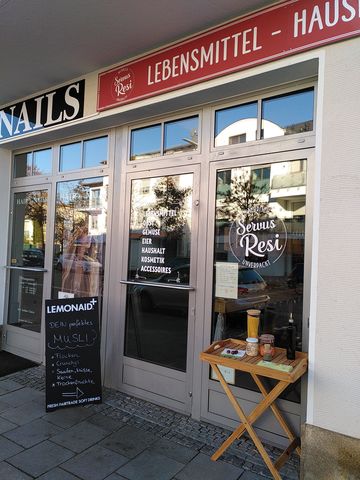
Gone the days of the pandemic spring and summer of 2020 when zero-waste groceries were blooming in town: Approximately at the same time as the Westend got its (now closed) neighbourhood shop, Servus Resi opened in Obersendling right before the lockdown in March 2020, in a non-descript middle of no-where near the Siemenswerke former industrial area. Don't let you fool by the uninviting environment at a noisy car road – what you'll find here is a busy neighbourhood gem nicely furnished in light wood, with a superb selection of dried herbs and spices aside the usual dry food, and a nicely arranged selection of household items. The greengrocery section is rather limited – local organic apples and potatoes in late autumn 2020 –, and there are no dairy or other food requiring cooling, but the shop offers both, liquid body care products and household chemicals from refill stations. Everything is supervised by the friendly shop-owner, Chrissy (not Resi) herself, and if you wish to get in touch with people from the neighbourhood take the burden to come here even from other parts of town.
In Laim Nebenan unverpackt ("package-free next door") followed in summer 2020. The latter is organised as a co-operative (though the location next to a co-operative bank is purely accidental) and sports a
small neighbourhood coffee place. They offer a very good selection of dry food, fresh fruit and veges, but less dried herbs and spices and no spirits. You can however buy wine and their selction of condiments and preserves in one-way glasses have the effect that you can do all the regular daily shopping here in one place if you don't come with more advanced expectations.
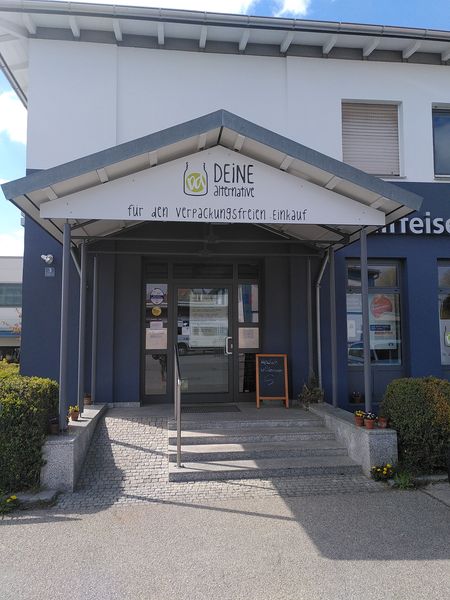
Half a year earlier, in January, 2020 another
co-operative, Deine Alternative ("your alternative") in Zorneding, opened on the premises of the former Raiffeisen co-operative bank, just a few steps from the urban train station.
When you get inside you will however immediately forget about its past as a bank, the shop is carefully and pleasantly decorated, with wooden furniture and equipped with a proper Italian coffee machine for a break in between. Most of the often local produce sold here is organically certified or at minimum sustainably produced, though it would be nice if conventional loose-weight products were clearly marked. In addition to the gravity bins and containers with dry food there's a decent selection of dried herbs and spices, sweets, bread, some confectionery, a small selection of fresh organic greens and veges, cheese and milk from the Nirschlhof organic farm (but interestingly enough no whole-meal flour or oils, vinegars or spirits by the litre). In a separate room you can buy toiletries, household chemicals and items supporting a zero-waste lifestyle. Everyone is welcome, but members of the co-operative pay less.
North of Zorneding, in the municipality of Poing, the co-operative
Bunte Bohne ("coloured/colourful bean") with its zero-waste supermarket cum cafe is facing a hard time as of June, 2023. Visit and support the place while you still can.
The neighbourhood of Trudering (a more than 1200 years old former village and suburb in the Eastern part of Munich) does not have a dedicated zero waste supermarket, but twice a month, on Tuesday afternoons, an indoor farmer's market dubbed Tante Trude ("Auntie Trudie") keeps popping up in the neighborhood associations' offices. Organic farmers offer local produce, and you can donate to the Trudelade project: home-cooked jam made from abandoned fruit trees in the neighbourhood (you'll get a jar as reward).
South-South-West of Munich, the city of Wolfratshausen (the endpoint of the S7 urban train) likewise sports a package-free shop centrally located at the Obermarkt market place: Ohnverpackt, another zero-waste shop opening within the corona lockdown in the spring of 2020,
is even certified organic. The few conventional products of regional origin are clearly marked as an exception. It does not only offer the usual dry food and household chemicals, but also a good selection of cheese and antipasti. What you won't find are fresh fruits and veges, meat and sausages.
There's a small day cafe, unfortunately all closed on Mondays.
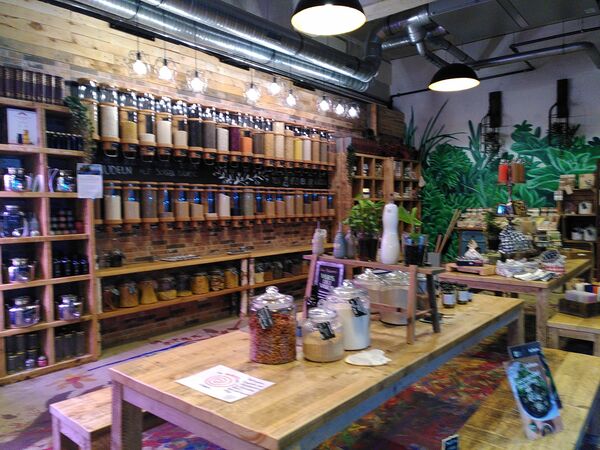
South of Munich, directly located at the S-Bahn station of Neubiberg the owner of the conventional Edeka supermarket opened a side project next door,
Hertscheck Unpacked which hopefully attracts people who usually wouldn't buy off the conventional supermarket tracks.
Although not marked most of the unpackaged dry food is organic – the shop assistant explained that since the shop itself isn't certified but fills the gravity bins and glass jars from bigger packages it isn't allowed to declare the products as "bio". There's also a good selection of loose-weight natural body care (both, in solid and liquid form) and household chemistry from brands I haven't found elsewhere. You can refill organic gin and regional (though not organic) whisky. The highlight of the shop are grow cabinets with special lamps where a good selection of herbs is grown, naturally free from agrochemicals. For city dwellers the place most certainly is worth
a bicycle ride (through the beautiful eco park Umweltgarten Neubiberg where an organic farmer's market is held on Thursday afternoons) or urban train tour even though the place has less liberal opening hours than the conventional supermarket next door.
Fun fact: The former premises of the Edeka supermarket now host a Vollcorner organic supermarket.
In smaller municipalities, (urban) train stations usually are the only public (and sustainable) transport hub and as such a natural place for zero-waste supermarkets. So I was glad to find a new (in 2022) co-operatively organised organic zero-waste supermarket in Unterföhrung, next to the S-Bahn train station. The shop dubbed
UFG (short for "unverpackt, fair, gemeinsam" – "unpacked, fair, together")
is open to everyone, with a 10 percent discount scheme for members.
It does not only offer dry food, condiments and household items, but also bread, rolls, cakes, dairy products and fresh, predominantly local fruits and veges. On Thursday afternoons you also may buy local organic meat and sausages, cheese and other fresh artisanal organic products from a mobile booth of the Tagwerk co-operative.
There's a small lunch cafe offering organic soups, quiches and sandwiches as well as cereal bowls, coffee, smoothies, tea and cake, all vegetarian, often vegan. Unfortunately you have to register with an app service to take your food with you in a returnable bowl or box, and nevertheless may have to come back to the shop to return it. So better bring your own boxes.
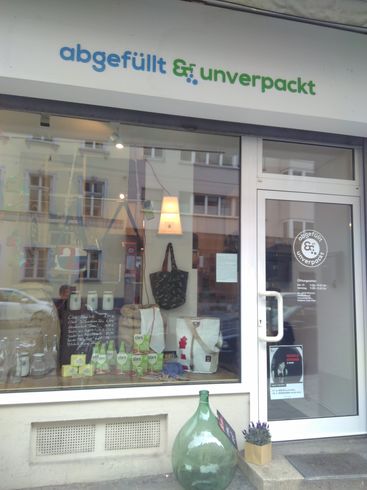
Plastic-free household
In March 2019 a tiny neighbourhood shop specializing in natural home cleaning opened in the Glockenbach neighbourhood: At Abgefüllt & unverpackt ("bottled and unpacked") the singer of the Munich-based band "Cat Sun Flower" warmly welcomes customers and passers-by and helps to (re)fill empty bottles with organic liquid household detergents. At the time of writing this shop was the only one in Munich selling washing powder by weight. In addition there are eco-friendly dishwasher tabs, body and hair soaps, fairly traded natural facecream in returnable glasses, towels, as well as upcycled and fairly traded bags and toiletry accessories.
About 20 years ago, Munich got its first – and to my knowledge only – organic department store centrally located a few steps from the Isartor: It consists of the city's first branch of the Basic supermarket chain with a self-service cafe on the ground floor and both, a self-service restaurant and a fashion and beauty store on the first floor. The latter,
Beauty & Nature, is a reliable source of organic clothes (with a focus on women and children), body care, home decoration, toys, dietary supplements and all types of sustainable household items including shoe shine, candles, seeds, cutting boards, or floor clothes.
Long anticipated, they started to offer refill for household detergents of the Sonett brand by the end of 2021, with a 10 percent discount. Since the staff is knowledgeable, friendly and helpful, do not hesitate to ask if you have any questions.
Supermarket chains
In autumn 2016 the local Vollcorner
supermarkets received an official permit by the Munich Department of Public Order (Kreisverwaltungsreferat) to fill customers' jars and boxes with
cheese, antipasti, processed meat products or cake. The Basic supermarket chain followed in summer 2017, while independent convenience stores often had done so anyway. What's missing are customers bringing appropriate containers or at least asking
the staff to fill their orders into returnable glass jars (Vollcorner, Lebascha and others) or stainless steel containers (Basic) provided by the shop itself. So be brave!
To avoid misunderstandings it is advisable to clearly point to your box (or ask for the deposit container) before placing your order at the sales counter and tell the staff to tape the receipt to it. Otherwise you may end up not sparing any waste: In the beginning the staff at the Basic butcher's disk would use the sheet of plastic-covered paper they'd usually wrap the purchase with to hand it over to you, along with the receipt taped onto the paper bag they otherwise would have used as outer packaging. In the mean time they got used to the procedure but were ordered to decline customer requests to buy meat this way. Since they started to provide stainless steel boxes for a deposit of 7 EUR there's however no excuse for one-way packaging here anymore. Artisanal organic butcher's shops will also fill meat into boxes you provide. The Herrmannsdorfer groceries (e.g. the one at Max-Weber-Platz) reward you with a few cents discount per saved packaging.
Until the end of 2022 Basic supermarkets had gravity bin dispensers for pasta, nuts, dried fruit, sweets, grains and more which all disappeared in the course of the company's
insolvency and take-over by the "teGut" chain. Package-free offerings at the remaining "Basic" branches are reduced to fruits and vegetables as well as food from the serviced bakery and butchers' counters.
The shops of the nation-wide operating Alnatura chain never offered refill dispensers. However, it has been increasing the range of products in returnable jars and bottles continously since 2021 – among others fairly traded nut butters, a number of dry products and even ketchup.
A small selection of dried fruits and nuts in refundable glasses as well as package-free toilet paper can be obtained from Vollcorner supermarkets. Their huge flagship store at Theresienwiese (with butcher's counter and lunch cafe) also experimented with a milk vending machine and a dedicated shelf offering all sorts of products in deposit glasses, but both efforts were discontinued due to low customer demand.
By the end of 2020 a number of conventional supermarket chains had introduced refill stations for dry food, too, but since you still have to do a lot of careful reading in front of the shelves to shop climate-friendly products, I won't mention them here, with one exception: the huge Tegut branch that opened in the Elisenhof shopping centre next to the main train station
in December 2020. This supermarket chain gives their customers a choice – all organic products are easily to recognise thanks to a light-green label on the shelves, and there's a great number of them in all product categories. Given the sheer number of products on sale the impressive refill rack at the left-hand side of the entrance aisle comprises only a negligible fraction of total sales, but it's a good start, and the best: All products in the gravity bins are organic. Come here for the biggest selection of package-free organic chocolate-covered sweets I've come across so far. There are grains, cereals, nuts, dried fruit, legumes and sweets, but no flour and surprisingly almost no pasta.
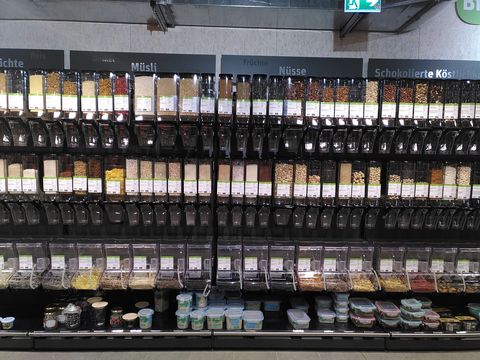
Although the supermarket has its entrance next to the Sunday-open (and if you ask me generally more pleasant) organic supermarket Biokultur in the Hauptbahnhof basement Tegut is closed on Sundays and public holidays as well as in the evening. When you have at minimum half an hour to change trains you will however reach to refill some of your dry food containers as long as you know how it works: Put your box onto the scales and choose "Tara-Bon". This will print a label. Fill the box and remember the product id on the lower end of the gravity bin. Put the filled box back on the scales and press the second "Bon" button beneath the "Tara-Bon" button. Now you will be asked to type in the product id. Scan the bar code on the previously printed label with the hand scanner, and there you go: A receipt with a price tag will be printed for you. Seal your box with this second label and hurry up to the cash counter.
Neighbourhood groceries
In Haidhausen the Lebascha neighbourhood grocery has been offering to fill all loose-weight products (cakes and bread, eggs, cheeses, olives, jelly gums and liquorice – note that the latter is not organic) in bottles, jars and boxes customers brought along. When the shop was taken over by the Ökoesel co-operative dispensers for grains, nuts and the like as well as household chemicals were added, and you can
buy all types of dried herbs and spices by the gram.
Ask for a deposit box in case you forgot to bring your own.
For home-made dried fruit stroll a few more steps down the street and see whether the Haidhauser Oase is open.
Household chemicals can be refilled at the Echt Bio Markt in Neuschwabing and at the Biochicco supermarket in the Au near Mariahilf-Platz. At the latter you can only refill original bottles of the Sonett label.
In Harlaching, the
independent Biowelt supermarket has a small zero-waste corner with dispensers for dry food, a good selection of loose-weight dried fruit and a dairy and butchers' counter where you can hand over your containers.
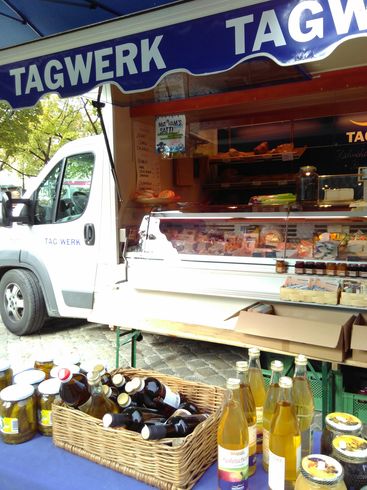
Farmers' markets
Once, sometimes twice a week farmers' markets are installed in many Munich neighbourhoods. Loose fruits and veges prevail here, and boothes selling organic produce (watch carefully for "bio" and "demeter" logos) will usually fill bread, cakes and pastries, antipasti, meat and dairy products into the containers you present. Notably at the boothes of the Tagwerk co-operative and the Hofbäckerei Steingraber you may be surprised to see that you're not the only one coming with her own boxes and jars.
On Saturday mornings you can find them next to the West-facing entry of Mariahilf church, in the neighbourhood of Au. Before the covid-19 pandemics all boothes (except the French fish monger) in the market block next to the church, right below the carillon, were organic,
but now it's no longer that easy. Therefore a comprehensive list: There are three organic market gardens (Biogärtnerei an der Isen alias Avanti Andi, Demeterhof Fahrenzhausen alias O'is bio and a third one also selling flowers and seedlings which you will immediately recognise when greeted with a friendly French accent). Put differently: Simply avoid the biggest greengrocery booth, "Helminger".
For meat, sausages, cheese and other dairy products there are the aforementioned two producers, and in addition the farm sale of Bergwinklhof Monigottsöd. The latter also offers a small selection of wine, but for good and knowledgeable advise on wines or non-alcoholic drinks to accompany a meal you'll better pay a visit to Uli Scheffler's organic wine trader's booth. While the juices are readly available in deposit bottles, returnable wine bottles are still very rare, and not used for high-quality wines.
If you feel adventurous on Thursday afternoons take the urban train S7 in direction Aying/Höhenkirchen-Siegertsbrunn/Kreuzstraße (or a bike ride) to the suburb of Neubiberg and pay a visit to the communal organic market on the pleasant premises of the Umweltgarten eco park, a true oasis within ugly suburbanity, with a small zoo, popular not only among kids. On Thursdays there's also an all-day market at Rotkreuzplatz. As on Mariahilfsplatz about half the boothes here are organic, though scattered all over the market area, with a cluster in direction Nymphenburger Straße.
Needless to say that the organic boothes on the famous Viktualienmarkt in the Munich city will happily support you when you make it clear that you want to use your own bags and containers. And the spring of 2021 did not only see the opening of an organic bakery in one of the solid market stalls in the northern part of the market, but also a tiny organic food shop for organic dry food grown and produced in the nearby Chiemgau region:
Satt und gut ("full and good") sells staple foods like grains, flour, eggs, honey and oil but also cookies, both pre-packaged and loose weight, partially from the smallest gravity bins I've seen so far. Note that this shop, unlike the market itself, is closed on Mondays
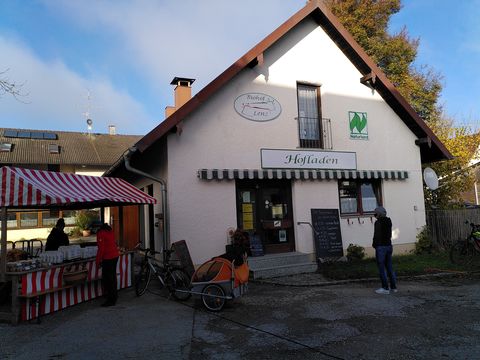
In Zorneding a small farmers' market is being held every Friday on the premises of the Biohof Lenz organic farm. Here you can buy local organic meat and meat products, cheese, bread, veges, and occasionally honey and bee products, wines and spirits. Although most stalls are organic there are a few exceptions offering conventionally produced specialities. The Lenz family's own farm shop keeps open at the same time and on Saturdays, but for buying their exceptionally good meat you should subscribe to their newsletter and order beforehand according to availability (you should be fast to answer). Unfortunately all the Lenz meat and sausages are vacuumized in plastic.
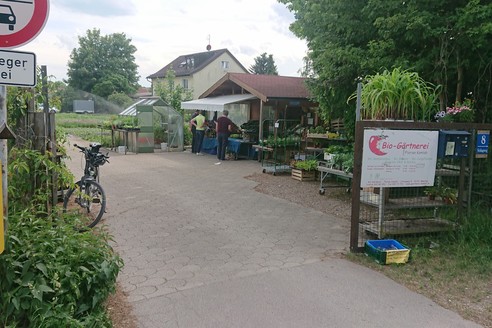
At the Western edge of town, in Pasing the organic market garden of Bio-Gärtnerei Kamlah has a farm shop open on Monday, Wednesday and Friday afternoons. You can not only buy salads and vegetables grown here but also organic seedlings for your balcony or garden patch. The farm has also a market stall at the Pasinger Viktualienmarkt which keeps open all days except Sunday offering a huge selections of organic fruit and veges, but no seedlings.
Tea shops
While coffee is readily available from
loose weight convenience stores, tea drinkers aren't well catered for: Usually you will find some tisanes and one or two types of black tea. Fortunately specialist tea shops still exist, and as they sell loose weight teas by the gram don't be shy and ask them to fill your tea box.
In the
Tee Gschwendner shop in the Asamhof backyard a few meters from the new pedestrian street of Sendlinger Straße this will work as long as the opening of your jar or box is wide enough for the shop assistant to fill it without touching it with her shovel. The franchise also sells conventional fare, so make sure to insist on organic quality – "Bio-Qualität" is the keyword. You'll find a decent selection of both, green, black and herbal teas, with and without aromatics. Bring a little time to stroll through the light and pleasant shop that has been at this place since the 1980ies, ask the assistant to show and suggest teas according to your taste and tell a little detail. When all your teas are filled into your jars you will be asked whether you fancy a tea sample, so it is smart to bring an additional small glass or jar.
Mind you that green tea doesn't store well in classic metal tea boxes as this material supports further oxidation processes.
In spring 2022 it turned out to be difficult to buy loose-weight organic flavoured tea as compliance to the EU regulation 2018/848 on organic products had not been established in time.
Coffee and food to take away
An increasing number of coffee places you may lend a Recup coffee cup for a deposit which you can return at any other shop participating in the retour scheme.
Some like the Neulinger bakeries will even give you a small discount for sparing the environment.
Most of the eateries reviewed here will fill your food into the boxes you provide for take-away as long as you make this clear before they start their usual routine which still means one-way packaging. Sushi to take away is available from Sushiya, and they will happily accept your bento boxes with your order.
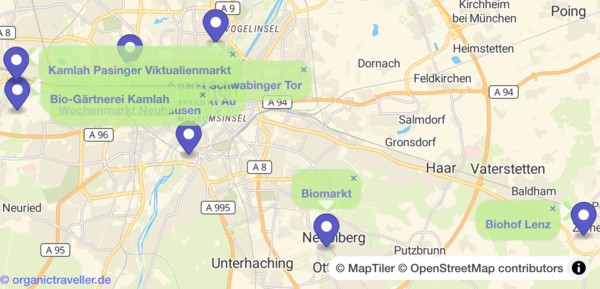
Closed
- Der plastikfreie Laden, Schlossstr. 7 (Munich's first zero-waste shop, also known as "Plastikfreie Zone", now online only)
- Mutternaturladen, Grünwalder Str. 244
- Mutternaturladen, Tumblinger Str. 45 (inside the Bahnwärter Thiel area
- Ohne, Schellingstr. 42
- Ohne Haidhausen, Rosenheimer Str. 85
- Naturverpacktes Westend Pur, Heimeranstr. 51a
- Evis – ab ins Glas, Pollinger Str. 11, Gilching
- Lela Lose, Freisinger Str. 3, Erding
2024-03-24 12:30:00
[Munich, Neubiberg, Erding, Gilching, Poing, Trudering, Unterfoehring, Wolfratshausen, Zorneding, Au, Haidhausen, Harlaching, Laim, Maxvorstadt, Pasing, Westend, organic, vegetarian, zero_waste, unverpackt, cafe, grocery, market, supermarkets, lunch, bakeries, butcher, tea, bodycare, household, sushi, wine]
Link

Wednesday, 21 February 2024
If you are looking for pioneers in the German zero waste movement you'll find one of them in Dresden's Neustadt neighbourhood:
Bring a selection of glasses, containers and bags and stop by Lose ("loose-weight"), a cosy zero-waste corner store in Böhmische Straße. Unlike other package-free supermarkets this one does not only sell dry food, natural body care and household chemicals but also offers veges and has a cheese counter. Although most of the products are organic some are not, so you might want to check the labels on the suspenders for the bio keyword or ask.
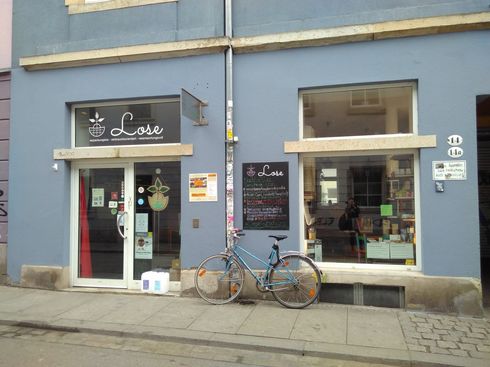
The interior of the shop was refurbished and is now much lighter and seems spacier than before. The reason for this is that the coffee corner which had been there before the corona pandemic has decreased and the serviced counter for bakery products, cheeses, antipasti and coffee moved from the entrance area to the backpart of the shop. Mind you: like other package-free shops Lose does not have an illuminated window front, so be brave to try the door handle – the place may look quite dark even when open.
Supermarkets with zero-waste stations
Moreover all shops of the co-operatively organised local wholesale chain VG Biomarkt offer a good selection of loose-weight organic dry goods (in addition to an abundance of often locally produced fruit and veges and dairy products and drinks of all kinds in returnable glass bottles).
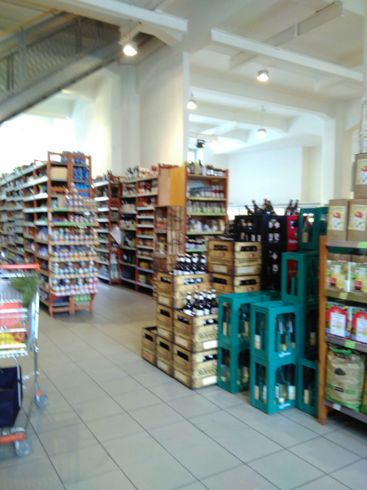
Their main shop is located near
Bahnhof Mitte train station, an entire organic warehouse on the premises of a former newspaper printing plant. Standing back from the main street the first floor is occupied by an organic convenience store supporting your zero-waste efforts. On the second floor there's a well assorted organic fashion store mainly for babies, children and women, with a section offering organic body care, household chemicals, sustainably produced toys, stationary and more.
For members prices are lower, but the shop is open to everyone.
On weekdays the self-service bistro directly facing the street offers delicious lunch (only snacks on Saturdays), and there's a cafe cum bakery shop featuring young local artists.
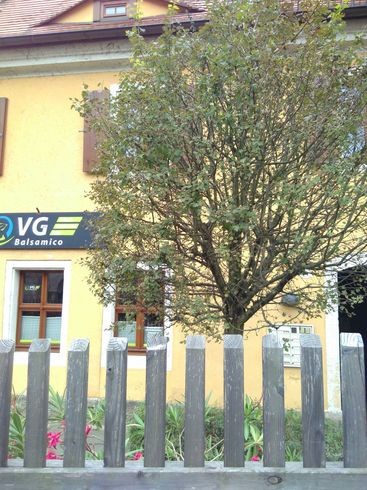
VG Biomarkt also has branches in the neighbourhoods of Neustadt (Hechtviertel), Striesen, Johannstadt, Strehlen, and Loschwitz,
Mind you that the one in Striesen, at Polandplatz isn't easy to find: Opposite the triangular park there's a driveway which one can easily miss as no sign at the entrance points to the shop. Be brave an move past, you'll find the shoü at the right hand site.
If you want to return empties, find the appropriate crate in the entrance area, pin down its code, tell the cashier and put the glass or bottle at the appropriate place.
The Loschwitz branch dubbed VG Balsamico is conveniently located
opposite the downhill station of the cable-run suspension railway ("Schwebebahn") next to
Körnerplatz at the northern end of Blaues Wunder ("blue wonder") bridge.
Opening hours and assortment (of loose-weight products as of products in returnable glasses) vary depending on the size of the market and the neighbourhood. However, all VG markets offer free drinking water refill stations and you can book cargo bikes to transport your purchase home free of charge.
While many organic groceries were closing, the Verbrauchergemeinschaft opened a new large supermarket with attached self-service restaurant cum cafe in 2023: The
VG Friedensstraße offers and abundance of loose weight and unpackaged products. Want to shop products grown or made in the vicinity? Watch out for the green "RP" ("regional partner") logo.
While these local groceries were early adopters a number of nation-wide operating organic supermarket chains have been following. In Dresden the two remaining branches of the Berlin-based supermarket chain Bio Company introduced dry food suspenders for use with your own jars.
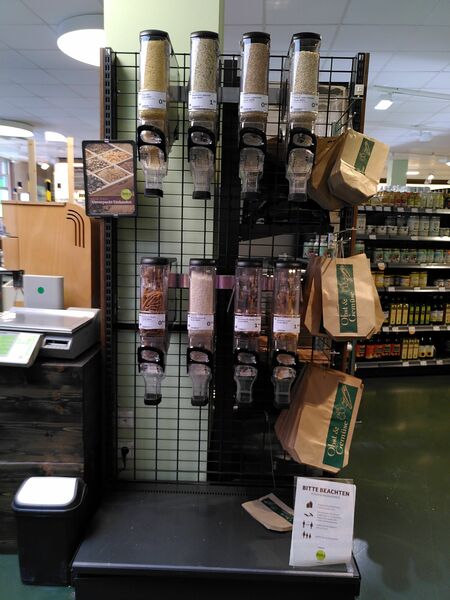
In 2021 the Denns Biomarkt was the first branch of this chain where I found a dedicated shelf with fairly traded dry food in retour glasses and a few gravity bins with nuts, seeds, rice and noodles. A start at least, although I have my doubts that this small selection will be sufficient to nudge people towards the extra effort it takes to bring along glasses and jars.
Without offering gravity bins the Vorwerk Podemus farm supermarkets supports package-free efforts, too: Hand over your own clean boxes and bags when buying meat and meat products, cheese, bread, rolls or cake from the services counter, and prefer returnable glass bottles and glasses when choosing jogurt, honey and jams.
Farmshops and factory outlets
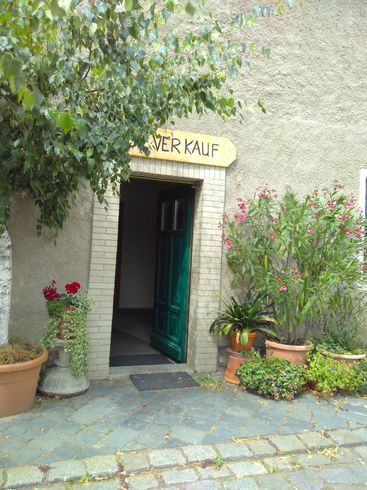
When you take the Elberadweg bicycle route on the southern shore in direction Niederwartha you'll pass a nice old farmyard, the organic Bauernhof Franz in Niedergohlis. It runs a subscription scheme – phone in or e-mail your order until Wednesday and collect it from the farmshop on Fridays and Saturdays, but if you happen to step by on one of these days and there's someone around you may be able to buy vegetable oil and perhaps also potatoes or other produce from the farm. But of course, shopping their farm products from one of the VG supermarkets might be easier.
In 2022 Vegannett, a Weißer Hirsch-based producer of vegan spreads, started filling products in standardized returnable deposit glasses which
you can buy directly from the manufacturer on Wednesdays.
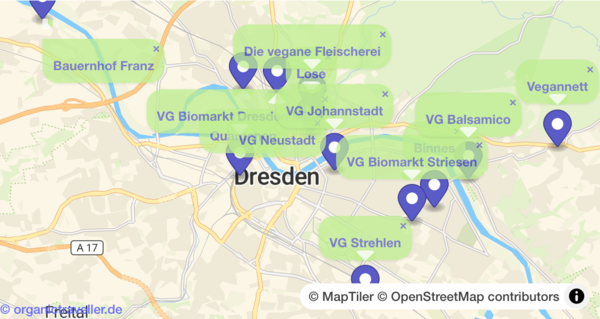
More to try
For more vegan alternatives to cheese, meat and sausages head for
Die vegane Fleischerei in the Neustadt. January, 2023 a vegan "butcher shop" opened here, and they assured me that all of their products are made from predominantly organic ingredients.
They also offer ready-made "meat" salads and soups, and I'm looking forward to visit the shop in person. Don't forget to take boxes and jars with you.
Closed
2024-02-21 04:00:00
[Dresden, Neustadt, organic, coffee, vegan, zero_waste, unverpackt, cafe, grocery, market, supermarkets, bodycare, household, hemp]
Link

Monday, 20 November 2023
The bigger conventional supermarkets seem to have at least a small selection of organic dry food, often conveniently assembled in a dedicated and marked shelf. But while obtaining a package of organic biscuits and tea bags is easy, you may wander a long way without spotting any opportunity to buy fresh fruits and veges, leave alone dairy products.
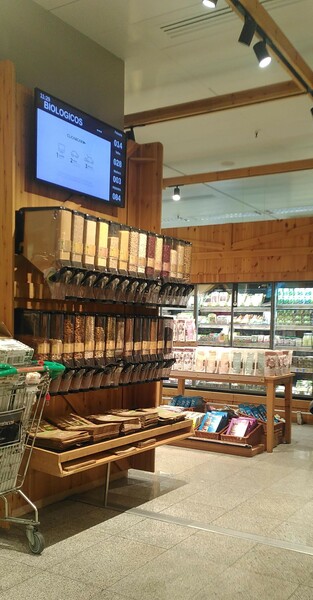
The first solution which may come to a traveller's mind is the upmarket department store of Sunday-open El Corte Ingles at São Sebastião tube stop. And indeed: In the middle of its food court there's a small organic shop-in-shop area with a separate fridge and a fresh fruits and vegetable section. Here I found the most expensive bottle of UHT milk I've seen so far, at a price tag of about 3.65 euros (fresh organic milk seems to be completely unavailable in Lisbon). Needless to say that the selection of dry food is very upmarket, including organic advent calendars before the Christmas season, so you will easily find a consumable gift, while you may breathe in deeply for the price tag of everyday food.
Good to know: There's a row of gravity bins from which you can fill unpackaged grains and nuts into your own containers, and the uncooled fruits and veges also come without packaging.
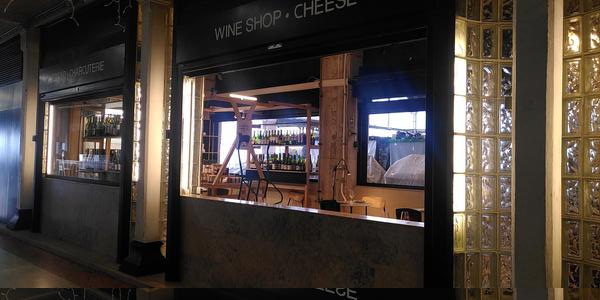
A small selection of shelled nuts as well as extremely tasty olives can be bought by the gram from Pigmeu da Ribeira, an upmarket delicatessen stall located in the central aisle between TimeOut and the traditional market at Mercado da Ribeira. Their main business is to offer a snack of cured meats, cheeses and olives from small-scale organic farms or a sandwich together with a glass of wine, everything extremely tasty and a pleasant alternative to much of the heavy food served in town.
But you can also buy bottles of natural wines, vacuum-packaged cured meat and cheeses, a small selection of preserves and seeds of flowers and vegetables. Everything here is organic, many products even biodynamic, but the price tag is quite heavy: The average bottle of wine goes between 20 and 30 euros, while the wage slip of the shop assistants remains at 800 to 900 euros a month for eight hours shifts.
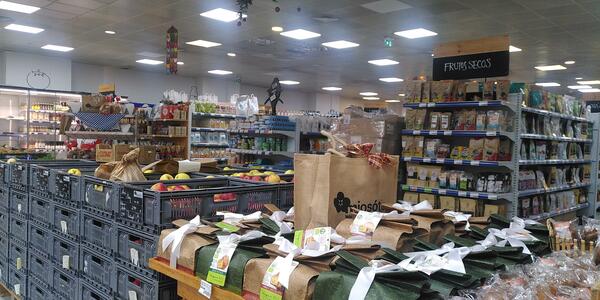
From one of the people working here I got the crucial information that there is a small chain of 100 percent organic supermarkets in and around Lisbon: Miosotis. One of their branches is only a few steps away from El Corte Ingles, and it is huge.
The bakery booth, the fruits and vegetables section and a decent row of gravity bins with dry food support a zero-waste lifestyle. Whether you need body care products of household chemicals, want to buy a bottle of organic port wine, or seasonal sweets, this is the first address to go. They simply have everything organic you need – except for fresh milk.
As its counterparts in much of central Europe the supermarket has a self-serviced cafe cum restaurant offering lunch and snacks. It's however closed in the evening.
If you prefer small crammed health food shops, the Bomercado near Largo do Terreirinho (a mini tram stop of number 12E in the old town) may be for you. Given the size of the shop, the selection of fresh produce is limited, and there are probably more imported products from German organic producers than from Portuguese ones, but you will find both, sufficient food and body care to survive.
Clothes and textiles
Zero waste is not only about the packaging of products to consumate, but also about re-using and up-cycling of long-living goods such as clothes. When I walked the streets of São Antonio/Misericordia I noticed a shop window presenting linen shirts which at once left the impression of being both, comfortable and long-living. I came back to Stró the other day to discover that there was more to it: beautiful caps, scarfs and pillow cushions made from natural fibers only, linen, wool, and cosy cotton jersey. For the scarfs, caps and home textiles traditional re-used fabrics and fibres as well as vintage dead stock fabrics made in Portugal
are being used.
Given the quality and longevity of these products made by small-scale producers in inner Portugal, they are very reasonably prized, even cheap if you're going to use them for a decade or longer.
There's a second Stró shop almost around the corner, and if you should be unlucky enough to arrive at one of the shops during lunch break, head for its sister shop as their breaks are not overlapping.
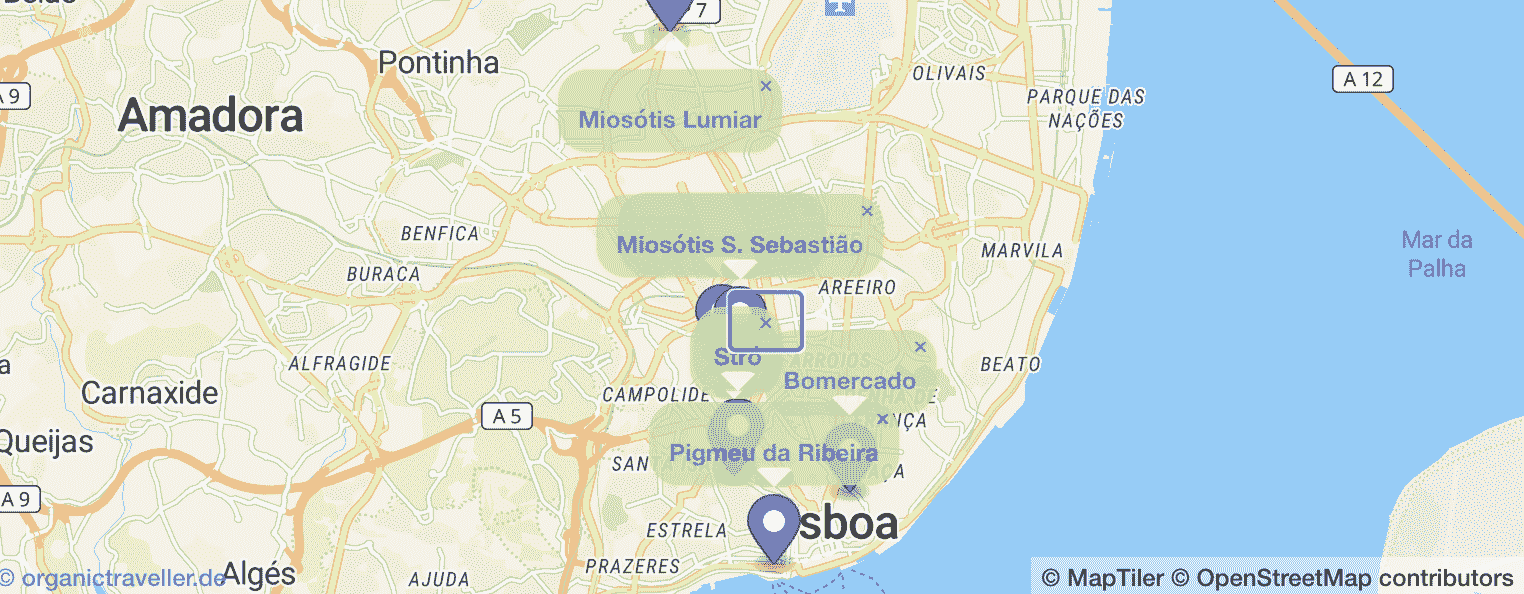
2023-11-20 21:35:00
[Lisbon, Lisboa, Lissabon, organic, zero_waste, unverpackt, cafe, grocery, supermarkets, deli, market, breakfast, lunch, coffee, snacks, bodycare, household, fashion]
Link

Sunday, 05 November 2023
While buying organic requires only a little extra effort in Salzburg, minimising waste is an entirely different issue. If you wish to carry home your purchases in your own re-usable containers you depend on the cooperation of the shop, which (even in organic supermarkets) can be surprisingly little. The covid-19 pandemics marked the beginning as well as the end of the (to my knowledge) only dedicated organic pay-by-weight grocery, GenussProGramm (a pun which can be translated as both, "pleasure by the gram" or "pleasure program") in the neighbourhood of Andräviertel.
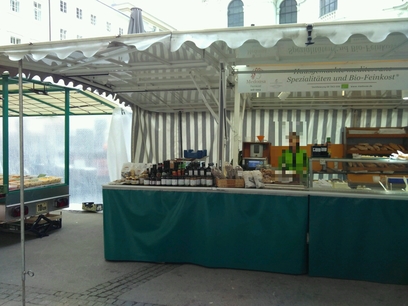
So what's left? As in other cities farmers' markets are a good bet: The Medousa market booth at the Grünmarkt opposite Fabi's Frozen Bio Yogurt within Mozart's birthplace offers to fill Italian-style antipasti and other mediterranean and vegetarian delicatessen into your jars, provided you ask for it. Although the market at Grünmarkt is held daily, there are no organic boothes on Mondays and Thursdays; the Medousa booth is here on Saturdays only. On Thursday mornings you can find it at the Schrannenmarkt opposite Mirabell castle.
At the Schrannenmarkt you'll also find the market booth of the
Ökoprodukte Feldinger organic farm which in the past used to run a fully organic supermarket in town. The booth is located next to Ändra church.
Offsite tourist tracks but on your way to Hellbrunn castle or zoo you'll find what until spring 2023 was Salzburg's only branch of the organic supermarket chain Basic.
Prior to its insolvency this organic retailer had a focus on reducing one-way packaging. While
the German Basic supermarkets were bought by the conventional tegut chain, the two Austrian branches
(the second one is located in Vienna) will continue as fully organic supermarkets of the Dennree chain.
However, I do not know whether gravity bins with dry food survived here as Denn's
has never had a focus on refill. As in most organic supermarkets fruits and veges usually are not pre-packaged, and serviced desks for bakery and dairy products allow you to take home products in your own boxes. There's also a slowly increasing range of products in returnable jars and bottles, but unfortunately these are usually more expensive than their counterparts in one-way packaging.
To refill milk around the clock head for the milk vending machine at the Erentrudishof organic farm in Morzg, a pleasant bike ride from the city. There's also a farmshop, of course with more restricted opening hours, where you also can buy eggs, spelt, wheat and rye produced by the farm.
Artisanal bakeries
When buying bread, rolls, cake or snacks from organic bakeries you should by now no longer meet strange looks when presenting your bag or container. But organic bakeries in town seem to be afraid of advertising themselves as "bio", so it can be difficult to spot them.
The most stylish one of them is the Salzburg branch of
Joseph Brot vom Pheinsten with its open baker's workshop a few steps away from the Mönchsberg elevator. Apart from deliciously smelling bread, rolls, cakes and snacks there's a small selection of dairy products, jams and preserves. You can also order organic (coffee) drinks and sit down on a table to have a snack or enjoy their patisserie. The bakery keeps open on Sunday mornings and public holidays.
Elisabethen-based artisanal bakery Pföß has a shop next to the Sternbräu area in the old town.
Unfortunately only the bread is promised to be organic, the white rolls tasted bland as if they were made of conventional flour. On the other hand the Krapfen doughnuts were a real delight, crisp and still a little warm, filled with fruity apricot purree instead of oversweet jam. If you come here for a snack stay away from the conventional softdrinks, and you may wish to ask whether the sandwiches are made with organic toppings.
If you want to be sure to get 100 percent organic bakery products, visit the Grünmarkt at Universitätsplatz: Three days a week you'll find the booth of Bio-Bäckerei Itzinger on its Eastern side, near the Ritzerbogen hallway. The bakery also offers vegan bread and rolls and has a focus on wholemeal products. On Thursdays you can find it at the Schranne Biomarkt.
Plastic-free lifestyle
Zero waste starts with the food, but does not end there: In order to reduce the amount of plastics ending up as microplastic in our environment and finally in ourselves it's crucial to reduce the use of the (undoubtedly useful) polymers in general: Don't throw them all away at once (as the biggest part of the carbon footprint of goods is in their production), but replace your plastic household items or clothes with plastic-free alternatives as soon as they are about to degrade.
In Salzburg there's a store to help you with that:
Damn Plastic in the Europapark mall in Taxham offers almost the entire range of plastic-free (or recycled) non-food, for inspiration
or replacement. Unfortunately their original shop in the inner city does no longer exist.
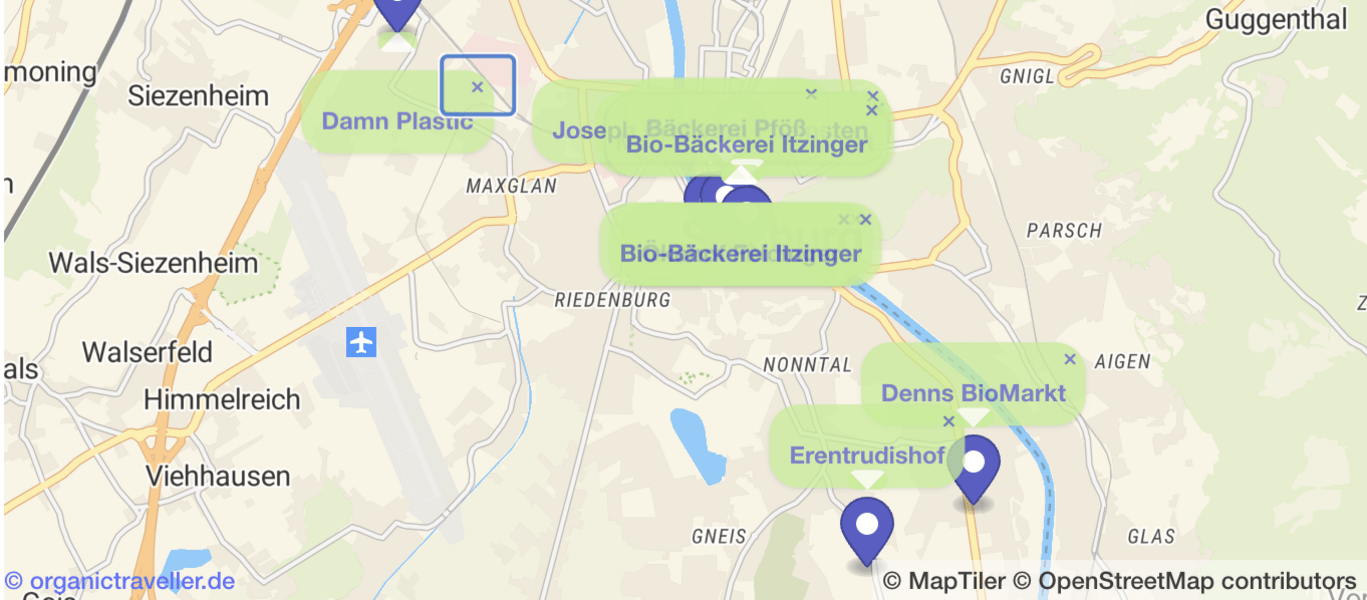
Closed
2023-11-05 18:00:00
[Salzburg, Vienna, organic, vegetarian, zero_waste, unverpackt, cafe, grocery, supermarkets, bakeries, deli, market, breakfast, coffee, snacks, farms, fashion, bodycare, household]
Link
































